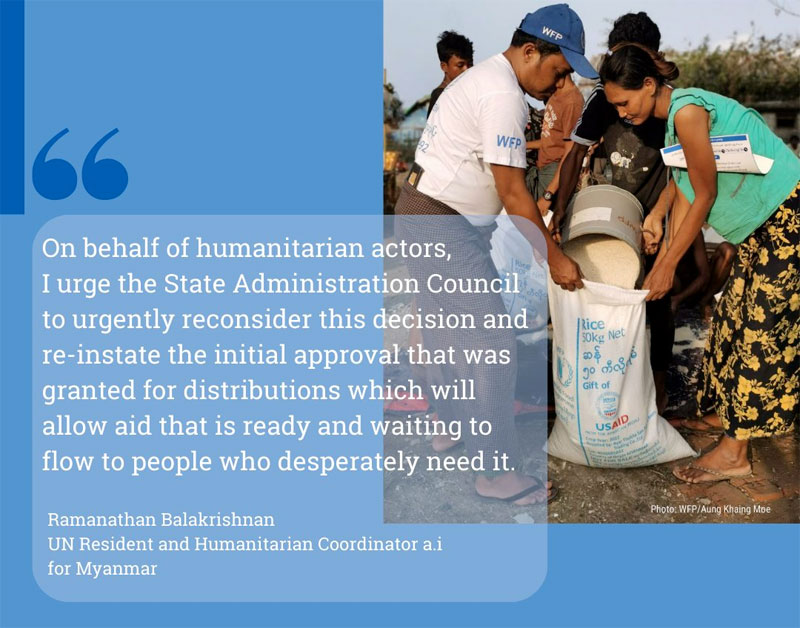- Extreme poverty drives Sittwe residents to dismantle abandoned houses for income
- Weekly Highlights from Arakan (Feb 23 to March 1, 2026)
- Over 300 political prisoners freed from 10 prisons nationwide
- DMG Editorial: Between War and Opportunity - A New Border Reality for Bangladesh and Arakan
- Arakan Army sets five-year prison term for kratom cultivation in controlled areas
Editorial: Help Don’t Hinder Aid to Post-Cyclone Arakan State
27 Jun 2023

Hundreds of thousands of houses were either damaged or destroyed by Cyclone Mocha, which hit Arakan State on May 14. The vast majority of storm victims are still struggling to rise from the wreckage.
Sittwe, Pauktaw, Rathedaung and Kyauktaw townships were hit hardest by the storm, which was also felt strongly in Myebon and Mrauk-U townships.
However, relief efforts by international aid agencies and local civil society organisations have been severely hampered by junta travel restrictions.
Following its failed talks in early June with the Brotherhood Alliance in which the Arakan Army (AA) is a member, the regime has imposed restrictions on delivery of humanitarian assistance as if it bears grudges against the tripartite military alliance. Its imposition of travel restrictions stands in stark contrast to its pledge to help the storm victims.
Regardless of one’s politics, let us all come together, at least, in gratitude for the hard-working electricity staff who have laboured day and night to bring Arakan State back on the grid in Cyclone Mocha’s aftermath. Some even died in the process.
The regime risks becoming a public abomination when it prohibits delivery of relief aid, including rice seeds for farmers. Such action will cost the regime a rare chance to salvage its image by instead helping to steer aid to where it needs to go.
Corrugated roofing sheets that arrived in Arakan State in the first few days after the cyclone were pocketed by the junta’s military units and departments. Residents have only got tarpaulin sheets, but then, the regime is imposing restrictions on the provision of tarpaulin sheets for civilians.
Local farmers in northern Arakan State are struggling to grow monsoon paddy as many cattle died and rice seeds were destroyed in the storm. The regime must help them immediately and effectively as the inability to grow rice will affect food security in the region.
With assistance provided by its fellow ethnic armed organisations, the AA has been providing help to storm victims in areas under its control. But the regime has been doing the opposite.
Those hit hardest by the storm are internally displaced people (IDPs) taking shelter at camps. Many had already lost their houses and had managed to survive on small amounts donated by international aid agencies. The storm came as another serious blow to them as it destroyed their temporary homes in the displacement camps.
Meanwhile, aid agencies’ efforts to provide shelter for storm victims including IDPs have been hampered by the junta’s restrictions.
Most of the displacement camps and some villages are at risk of diarrhoea and dengue fever outbreak as they have been forced to drink unclean water.
It will take time to rehabilitate Arakan State, where Cyclone Mocha has destroyed or damaged hundreds of thousands of houses. But for emergency relief efforts to take effect, the regime must lift restrictions.
Price hikes are also making it difficult for many to rebuild or repair their houses damaged by the storm. Businesses should not take the difficult circumstances of post-cyclone Arakan State as an opportunity to price gouge. The regime must also regulate merchants and businesses in Arakan State to make sure they do not overcharge.
Shelter is one of the basic needs of mankind, and is arguably even more important than food currently for storm victims in Arakan State. The regime, therefore, should put aside its resentments, whatever they may be, and instead lift restrictions and collaborate with social organisations to deliver aid to those in need.
DMG also urges Arakanese communities at home and abroad to do their fair share to provide shelter and financial assistance to their kith and kin.








.jpg)











